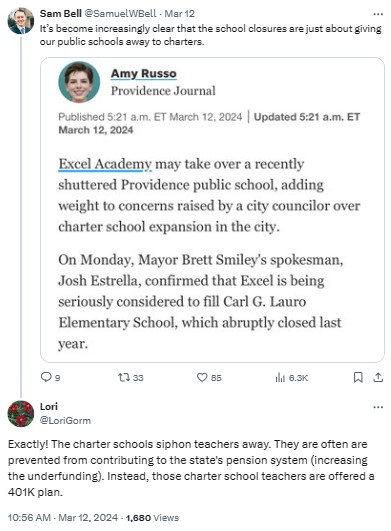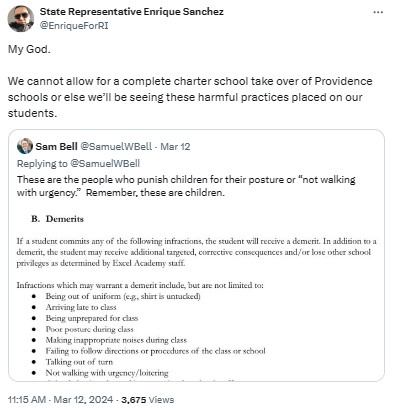Arguably, Eric Abbenante— overstates the degree of “debate” in this clip featuring Dr. Phil and Bill Maher, but the difference in point of view he highlights is the crucial one. Here’s Abbenante:
Bill Maher and Dr Phil debate the importance of family and religion:
“You think family and faith are a big fix to the problems we have. I don’t have a family, and I definitely don’t have faith”
“Then you’re definitely not part of the solution”
Bill Maher being anti family is frankly, eugenic.
Maher actually nods toward — and quickly veers from — a key point when he says that the country is headed in his direction and that Dr. Phil might argue that’s why things are falling apart. That’s precisely what I would argue, but not in the direct, practical way Maher (and Phil) suggest.
There’s a step between “no faith or family” and “country falls apart.” What we have in the West, right now, is a meaning crisis, which is manifesting in all sorts of ways, and which will be the end of our civilization if we don’t turn back from it. Our loss is not a practical calculation that can be fixed. Dr. Phil argues that faith and family intertwine to produce children, the absence of whom necessitates immigration, which creates additional problems. To this, Maher and his sympathizers might respond that we need only solve those problems, and we’ll have solved the problem of lost faith, too. But they’ll never manage to knot all the loose ends of this unraveling fabric.
If Dr. Phil had made the full case I’ve heard from him on the shows of those who agree with his beliefs, Dr. Phil might have asked Maher whether he is genuinely happy. We can predict that Maher would have offered an enthusiastic “yes,” and while we might suspect he is not as happy as he claims, or is deceiving himself in some unhealthy way, we cannot read his heart. In any event, our suspicions will never overcome his own testimony about himself.
The happiness question is only to set up the next questions: Does he believe that he’s been fortunate in his life? Of course he has. How many people does he think can follow his path? Not that many.
And then to empathy: Does he think that those who have not enjoyed his good fortune might, on average, have needs — not material needs, but emotional and spiritual needs — that are, at least, distinguishable from his? Does he feel they deserve comfort and confidence in life, even where good fortune doesn’t supply material comforts in abundance?
Here, a socialist might take the microphone to insist we need only take some of the abundance from the Mahers and give it to those who are less fortunate. Even if Maher would assent, however, this wouldn’t fill the lack. People don’t want only comfort; we want meaning, as well… maybe above all. Being given comfort without having earned it does not answer our longing.
Yes, members of our society increasingly long for the life of the Mahers, both in financial success and the meaning we imagine comes with notoriety. This might explain the trend of young adults’ turn to social media to find a life like Bill’s as “influencers.” At least in his version of that trajectory, Bill Maher has encouraged genuine conversation and thought; how quickly his example deteriorates!
The rich man who happened to be out on his yacht when the flood came cannot claim his good fortune disproves the necessity of solid ground. And the rest of us should not look to a celebrity who enthusiastically applauds the decline in church attendance — which heralds the deterioration not only of organized religion, but also of family and community — as representative of anything other than a dark, cynical error from which we must turn away.
Featured image by Justin Katz using Dall-E 3.
[Open full post]I don’t doubt Ken is being honest about his findings, or lack thereof, from his voter fraud review in 2020, but from the very first, I’ve though he’s was overstating his scope and the extent to which his investigation was conclusive. Very plainly put, “I did not find evidence” is not the same as “there is no evidence to be found.”
Mark Davis, who also investigated the election, takes Block to task on exactly these grounds in an important article on The Federalist which honest journalists would ask Block about in every interview. Unfortunately, we’re a long way from a civic society in which such things could be expected.
One suspects that if Block’s book told an opposing story — if it were Proven, rather than Disproven — its national promotion would have been much less enthusiastic. Odds are good the local media in Rhode Island would have ignored it entirely.
That’s the civil society in which we live. The guardians of the public square aren’t interested in robust, reasonable debate. It’s vulgar political warfare to them. And it’s disappointing to see a good-government advocate cash in on our devolution. Davis ends by suggesting Block won’t likely be hired to do such work again, given how publicly he’s betrayed the trust of his highest-profile client. Local reformers in RI should take note, too.
[Open full post]Joe Biden abusing the authority of his office to buy votes by transferring student loan debt to other Americans is back in the news, and it reminds me that I haven’t seen any mainstream coverage of a disaster facing just about every college-bound family in the United States this year:
If, like me, you have a college-bound high-school senior in your family, you’ve likely been on the receiving end of yet another colossal screw-up by our federal government: the overhaul of the Free Application for Federal Student Aid, commonly known as the FAFSA. Every year, students (or more commonly their parents) need to fill out the FAFSA with information about their income, assets, and expenses in order to qualify for federal student aid. Many colleges require the FAFSA before awarding other forms of need-based aid, and some require it to be filed even by people without need before they can qualify for scholarship aid. There’s a more detailed and onerous form, the CSS, operated by the College Board and required by some schools. Filling these out is like doing your taxes, only more so. Typically, the forms are available in October, and schools may set filing deadlines in the fall so that they can deliver financial-aid awards at or near the time they send out acceptances.
Not this year. The FAFSA wasn’t even fully available until January 8, after the Department of Education briefly flicked on the lights on the form on December 30 just so it could claim that it launched in 2023.
This is not just conservative media hype. My family is grappling with this at the moment, and yet the regime media seems not to care. The media’s inability to hold Democrats accountable is one of the strongest argument for voting for the other party, even though Republicans aren’t as apt to give you cash for your vote.
[Open full post]On WNRI 1380 AM/95.1 FM, John DePetro and Justin Katz discuss:
- Avedisian tea leaves
- Lawyers on the case of the Washington Bridge
- Neronha v. McKee via text
- Voting becoming less and less secure
- Bike lanes v. traffic emergencies
- Lawyers make out on stadium deal
- The RIGOP goes all volunteer
Featured image by Justin Katz using Dall-E 3.
[Open full post]For an academic project not long ago I reviewed data on RIPTA bus routes, including surveys of riders of every line in the system, so the unstated assumption of Antonia Noori Farzan’s recent Providence Journal article on the subject jumped out at me. The headline is, “What’s it like to rely on RIPTA to get around the state? We tried it for a week.” And the not-quite-articulated assumption is that traveling around using public transit should be attractive even when compared with the ease of cars in a suburban area.
There simply is not the demand to maintain a system that can get any given person to any given location in the state painlessly. The area didn’t develop for that, and the people don’t really want it.
Frankly, I doubt progressives even want to provide it for them. It would take larger buses that require fewer drivers in urban areas and smaller buses (or vans) with more amenities for suburban commuters and others, perhaps with less-expensive labor. Journalists would start writing articles about the contrast in comfort level between the two, while at the same time expressing outrage that urbanites have to pay so much to travel to the suburbs.
Cars are efficient modes of travel, and they are symbols of freedom. Government should focus on improving our infrastructure and reversing the regulations designed to make them too expensive for working class Rhode Islanders.
[Open full post]Some months, it surprises me to find economists still putting out regular analyses of government employment statistics. Perhaps I’m too jaded, but I’ve completely lost confidence in the data.
I used to have my monthly jobs review posts for both the Ocean State Current and the RI Center for Freedom & Prosperity, but during the two years of overlap between the Obama administration in Washington and the Raimondo administration in Rhode Island, the numbers became difficult to take. The huge revisions to the data began to seem conspicuously to help Democrats, which Raimondo amplified by using her many PR people to spin, typically by digging out any narrow cut of the data that would look positive.
At this point, our economy has become so distorted, I’m not sure the government statistics would be accurately describing the job market even if they were objectively collected and presented.
If I’m remembering the plot correctly, the 2005 movie, Land of the Dead, imagined a world in which living humans had taken refuge in cities while zombies wandered the suburbs. One character observes that the zombies seemed to have become more cognizant, with some of them going about the trappings of their previous lives, like pretending to work a gas station.
That’s how analysis of economic data feels to me now.
[Open full post]Here’s a good addendum to my post, yesterday, about progressives’ response to discipline policies in charter schools:
Those who oppose school choice are also limiting the options for teachers. They’re only about control. They want to make sure teachers can’t get out of the pension system, and they want to make sure children can’t get out of the schools. They care less about making it work for everybody than about controlling it, and the worse their management of what they control, the more they have to increase control.
Such a system structurally cannot correct itself, which is why we are where we are in so many areas of society.
[Open full post]After the governor’s press conference on the Washington Bridge recently, as we struggle to figure out how to pay for a new bridge, Democratic leaders made a statement essentially saying, “We need money for this bridge — you must vote for Democrats, because we can’t send a Republican to D.C.”
That doesn’t even pass the sniff test.
RI Democrats have controlled this state for over 80 years. Over that period the following has happened: The industrial heritage of RI has died. Once a great manufacturing mecca, we are now a service-based economy. Our population is aging rapidly because our children are leaving to find good paying jobs and houses they can afford — neither of which can be found in Rhode Island.
Municipal and State Pensions.
The Democrats wrote your contracts.
The Democrats failed to properly fund your pensions.
The Democrats created the “solution” in the 2011 Pension Reform Act (U.S. Commerce Secretary Raimondo).
The Democrats haven’t given you a cost of living adjustment (COLA) or any consideration since then.
The Democrats voted against a Republican amendment to give you a COLA when all that federal money came to the state.
The Democrats don’t have a solution to this and aren’t looking for one.
When you’re wondering how you’ll pay your bills, or working 5–7 years beyond your retirement date, think about who you vote for.
Roads and Bridges — Consistently & Currently Rated the Worst in Our Nation.
The Democrats control the Department of Transportation (DOT).
The Democrats control who the contracts go to.
When RI couldn’t pay for roads and bridges, the Democrats created the RhodeWorks truck toll program.
Just as House Republicans predicted, the courts ruled the truck tolls unconstitutional, as they violated the “Federal Dormant Commerce Clause.” Those words are in quotes because you can find them in two places — my former Republican colleague Blake Filippi’s floor speech against the tolls and in the judge’s decision when he struck them down as unconstitutional.
The Democrats are responsible for your hell on the roads.
When you’re sitting in traffic on the Washington Bridge, or changing a flat because of a pothole, think about who you vote for.
Education.
The Democrats control Rhode Island Department of Education (RIDE) and have written the rules and contracts.
The Democrats have overseen the steady demise of quality in public education.
The Democrats continually throw money at education with no improvement.
The Democrats answer to the teachers unions — not parents or pupils.
The Democrats don’t want to try something different. They hate the most effective sources of public education, charter schools, and are trying to close them down.
The Democrats are responsible for the high schools with 0% proficiency in math and test scores in the bottom of the nation.
When you’re applying for a limited seat in a charter school, or working that third job to pay for private school, or angry because your high school graduate can’t do basic math, think about who you vote for.
Healthcare.
The Democrats created the Affordable Care Act.
The Democrats created the RI healthcare exchange.
The Democrats wrote the regulations and insurance requirements that the Office of Healthcare Insurance Commissioner stated were the reason our healthcare system is collapsing.
The Democrats are responsible for medical staff fleeing our state because reimbursement rates in Massachusetts and Connecticut are so much higher, and they only need to drive 30 more minutes to work in those states.
The Democrats are responsible for you spending 600% more time in the ER waiting room.
The Democrats created this failed system.
When you’re unable to get into a primary care doctor, or a specialist, or are sitting in the ER waiting room for 12 hours with chest pains, think about who you vote for.
Taxes.
The Democrats created the second-highest tax burden per citizen in the U.S. here in RI. Only Hawaii has a higher tax burden, and while RI beaches are awesome, they aren’t “Hawaii Awesome.”
The Democrats’ only solution is to throw money at every problem, thus increasing taxes.
The Democrats create unfunded mandates for our towns which cost our towns money that they can only get if they raise our taxes.
The Democrats are directly responsible for your homeowner’s taxes increasing every single year.
When you are writing that tax check to your town even after you’ve paid off your mortgage, think about who you vote for.
Economy/Business Climate.
RI has one of the worst business climates in the country. Every reputable business organization that ranks the business friendliness of every state places RI at or near the bottom.
The Democrats have over-regulated business.
The Democrats have punished success through taxation.
The Democrats view industrialists/business owners as “the evil rich” and if you haven’t been paying attention, the Democrats have been repeatedly stating that “the rich need to pay their fair share.”
The Democrats continue to hammer businesses with burdens through regulations that take time away from actually running your business.
When you’re up at 1:30 a.m. working to remit your quarterly sales tax to the state, or wondering how many people you’ll have to lay off, or considering closing your business altogether, think about who you vote for.
Energy Costs.
The Democrats have been pushing the unrealistic and unachievable green energy fantasy.
The Democrats passed the Act on Climate in 2021 that requires you to get rid of your gas stove, oil furnace, and wood stove and power your house, heat your water, and drive your car with electricity.
The Democrats benefit from the contractors installing wind/solar.
The Democrats caused your electricity rates to increase by 46% (and climbing) and your commercial electricity rates to go up 28%.
The Democrats don’t care you can’t afford to comply with the climate act and have actually put legal penalties in place if you don’t comply.
When you have to buy an electric car that you can’t afford or rely on, or getting rid of your woodstove to replace it with electric heat, think about who you vote for.
Considering all these things, what solution do the Democrats of Rhode Island offer you when their bridge failed because of their negligence?
“Keep voting Democrat; Republicans can’t help.”
Over a week in 1973, two criminals holed up with four hostages in a Swedish bank vault. Cut off from outside reality and locked in shared privation, the captives grew more sympathetic to the criminals than to the people trying to rescue them. Does this textbook Stockholm Syndrome seem familiar to Rhode Islanders?
Republican House Minority Leader Michael Chippendale represents District 40 (Coventry, Foster, and Glocester) in the General Assembly.
Featured image by Justin Katz using Dall-E 3.
[Open full post]These sentiments from two prominent Rhode Island progressives are worth noting:
“Harmful practices.” “Punish children.” They’re talking about demerits for things like being late or unprepared for class.
Notice that they don’t care whether these policies could help some children. Either in their arrogance they think they know better or in their malice they want to cultivate a generation that has no self-control. A healthy society would keep people like Sanchez and Bell as far as possible from the ability to set policies related to children.
[Open full post]Rich Weinstein’s quip, here, exposes a deadly serious problem with the progressive style of governance:
Rhode Island jumped into ObamaCare with both feet, and not only are our hospitals struggling, but people are having a terrible time finding primary care doctors. Maybe those two things are cause-and-effect, maybe they’re loosely related, or maybe there’s no connection at all, but contrast the absolute surety that ObamaCare would fix all problems with the complete disinterest in exploring new problems that have arisen since it was passed.
If government control were to be effective, it would have to be characterized by continual measurement and reassessment, but the incentives are exactly the opposite. We don’t get the power of government bent toward cool, clinical evaluation. We get that power intent on avoiding questions and passing blame to others.
[Open full post]







